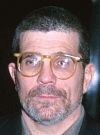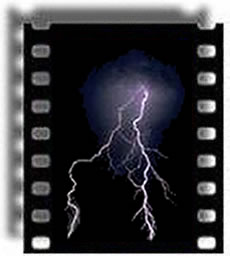
|
|
David Mamet
|
|
30 November 1947
|
|
Chicago, Illinois, USA
|
|
A noted American playwright, David Alan Mamet, was born in Chicago on November 30, 1947. He studied at Goddard College in
Vermont and at the Neighborhood Playhouse School of Theater in New York. He has taught at Goddard College, the Yale Drama School, and New York University, and regularly lectures
to classes at the Atlantic Theater Company, of which he is a founding member. David Mamet is a leading American playwright whose spare, gritty work reflects the rhythms of Harold
Pinter and the tough attitudes of his native Chicago. Noted for his strong male characters and their macho posturings, Mamet's knack for creating low-key yet highly charged verbal
confrontations in a male-dominated world has consistently made his work fodder for discussion and deconstruction.
He began his career as an actor and director before achieving acclaim in 1976 for three Off-Off Broadway plays, The Duck Variations, Sexual Perversity in Chicago, and American
Buffalo. The Woods (1977) and Edmond (1982) were followed by two enormously successful plays, the Pulitzer Prize-winning Glengarry Glen Ross (1984), a scathing representation of
American business practices, and Speed-the-Plow (1988), which savagely reveals the amoral underside of the film industry. Describing the afterlife of one of its Hollywood
antiheroes, Bobby Gould in Hell (1989) is also an exploration of Mamet's considerable misogyny.
Beginning in the late 1970s, Mamet enjoyed a number of stage successes before his first produced screenplay The Postman Always Rings Twice (1981), adapted from the novel by James
M. Cain and directed by Bob Rafelson, marked an impressive screen debut. He then turned out three meticulously crafted scripts: The Verdict (1982) with Paul Newman as a Boston
lawyer on the skids; the less successful screen adaptation of his play Sexual Perversity in Chicago expanded and retitled About Last Night... (1986), revolving around a couple
fleeing the singles scene; and The Untouchables (1987), a blockbuster update of the well-remembered TV series. Mamet made his directorial debut with House of Games (1987), which
he also wrote, a slick, engrossing study of confidence trickery starring his then-wife Lindsay Crouse and Joe Mantegna.
The prolific Mamet also wrote and directed the whimsical comedy Things Change (1988) and the uneven but occasionally gripping police thriller Homicide (1991), both also starring
Mantegna. His Pulitzer Prize-winning play Glengarry Glen Ross (1992), recreating the atmosphere of a gritty Chicago real estate office, was adapted into an acclaimed 1992 film
directed by James Foley and starring Al Pacino and Jack Lemmon. Louis Malle used Mamet's translation of Chekhov's Uncle Vanya in Vanya on 42nd Street (1994), which reunited the My
Dinner With Andre team, Andre Gregory and Wallace Shawn, as members of a company rehearsing the play-within-the-movie. Mamet wrote and directed the screen version of Oleanna
(1994), based on his stage play of the same title, a two-character confrontation involving charges of sexual harassment between a male professor and one of his female
students.
Plays
-
American Buffalo (1976)
-
Bobby Gould in Hell (1989)
-
Boston Marriage (1999)
-
The Cherry Orchard (adapted from Anton Chekhov)
-
Collection of Dramatic Scenes and Monologues
-
The Cryptogram (1995)
-
D. (now part of The Old Neighborhood - 1997)
-
The Disappearance of the Jews (1982) (now part of The Old Neighborhood - 1997)
-
Five Television Plays (1990) (includes A Waitress in Yellowstone (or: Always Tell the Truth), Bradford, The Museum of Science
and Industry Story,
-
A Wasted Weekend (1987 Hill Street Blues episode), and We Will Take You There)
-
The Frog Prince (1984)
-
Glengarry Glen Ross (1984)
-
Goldberg Street: Short Plays and Monologues (1985)
-
An Interview (part of Death Defying Acts, which includes Central Park West by Woody Allen and Hotline by Elaine May)
-
The Jade Mountain (unpublished)
-
Jolly (now part of The Old Neighborhood - 1997)
-
A Life in the Theatre (1977)
-
A Life With No Joy In It
-
Lone Canoe or The Explorer (1979, unpublished)
-
Mackinac (1972)
-
No One Will Be Immune (1994)
-
The Old Neighborhood (1997): (includes three previously solo plays, The Disappearance of the Jews, Jolly, and D.)
-
Oleanna (1992)
-
The Poet and the Rent (1981)
-
The Power Outage (in The New York Times) (1977)
-
Red River (1983) (adapted from Pierre Laville)
-
Reunion and Dark Pony (1979)
-
Revenge of the Space Pandas (or Binky Rudich and the Two-Speed Clock) (1978)
-
The Sanctity of Marriage
-
Sexual Perversity In Chicago and The Duck Variations (1977)
-
The Shawl and Prairie du Chien (1985)
-
Short Plays and Monologues (different from Goldberg Street) (1981)
-
The Spanish Prisoner (1973)
-
Speed-the-Plow (1988)
-
The Three Sisters (adapted from Anton Chekhov)
-
Three Children's Plays (1986)
-
Squirrels (1982)
-
Uncle Vanya (1994) (adapted from Anton Chekhov)
-
Vint (1985) (from story by Anton Chekhov)
-
The Water Engine, An American Fable, and Mr. Happiness (1978)
-
The Woods (1979), Lakeboat (1981), and Edmond (1983)
Screenplays
-
About Last Night... (1986) - (adapted from Sexual Perversity in Chicago, Mamet does not get a writer's credit)
-
American Buffalo (1996)
-
The Edge (1997)
-
Glengarry Glen Ross (1992)
-
Hoffa (1992)
-
Homicide (1991)
-
House of Games (1987)
-
Lansky (1999, TV)
-
A Life in the Theatre (1993, TV)
-
Oleanna (1994)
-
The Postman Always Rings Twice (1981)
-
Rising Sun (uncredited) (1993)
-
Ronin (as Richard Weisz, withJ.D. Zeik) (1997)
-
The Spanish Prisoner (1998)
-
State and Main (2000)
-
Texan (1994)
-
Things Change (with Shel Silverstein) (1988)
-
The Untouchables (1987)
-
Vanya on 42nd Street (adapted from Anton Chekhov's Uncle Vanya) (1994)
-
The Verdict (1982)
-
Wag The Dog (with Hilary Henkin) (1997)
-
The Water Engine (1992, TV)
-
We're No Angels (1989)
-
Whistle (2000)
-
The Winslow Boy (1999)
Director
-
Homicide (1991)
-
House of Games (1987)
-
Oleanna (1994)
-
Ricky Jay and His 52 Assistants (HBO Special, 1997)
-
The Spanish Prisoner (1998)
-
State and Main (2000)
-
Things Change (1988)
-
The Winslow Boy (1999)
Fiction
-
The Bridge (short story) (1985)
-
The Old Religion (1997)
-
The Village (1994)
Non-Fiction
-
Air Plays (in Horizon Magazine) (1982)
-
The Cabin: Reminiscence and Diversions (1992)
-
Conventional Warfare (in Esquire Magazine) (1985)
-
Essay: A National Dream-Life (in Dramatists Guild Quarterly) (1978)
-
First Principles (in Theater Magazine) (1981)
-
Jafsie and John Henry; Essays (1999)
-
Learn to Love the Theater (in Horizon Magazine) (1978)
-
Make-Believe Town: Essays and Remembrances (1997)
-
Mamet in Hollywood (in Horizon Magazine) (1981)
-
My Kind of Town (in Horizon Magazine) (1981)
-
On Acting (1999)
-
On Directing Film (1991)
-
A Playwright Learns from Film (in The New York Times) (1980)
-
Playwrights on Resident Theaters: What is to be Done? (in Theater Magazine) (1979)
-
The Pool Hall (in Rolling Stone Magazine) (1986)
-
A Sad Comedy About Actors (in The New York Times)(1977)
-
Some Freaks (1989)
-
Three Uses of the Knife: On the Nature and Purpose of Drama (1998)
-
True and False: Heresy and Common Sense for the Actor (1997)
-
A Whore's Profession (1994)
-
Writing in Restaurants (1986)
Poems
-
The Chinaman: Poems (1999)
-
The Hero Pony (1990)
|




